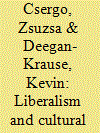| Srl | Item |
| 1 |
ID:
122779


|
|
|
|
|
| Publication |
2013.
|
| Summary/Abstract |
This contribution focuses on the consequences of the international controversy over Kosovo's unilateral declaration of independence (UDI) for domestic debates over sub-state territorial restructuring. The main argument is that, in the absence of a clear distinction in international politics between secessionist and non-secessionist claims, state elites employ 'Kosovo' effectively for invoking the spectre of secessionist violence even in consistently non-secessionist and non-violent settings, delegitimising all culturally framed claims for territorial restructuring. This strategy leads to radicalised group claims and increased democratic fragility. The Romanian case highlights the imperative to take seriously non-secessionist claims as a separate category of study and international norm-setting.
|
|
|
|
|
|
|
|
|
|
|
|
|
|
|
|
| 2 |
ID:
102827


|
|
|
|
|
| Publication |
2011.
|
| Summary/Abstract |
This article relies on cases from new EU member states in postcommunist Europe to integrate two overlapping debates about majority-minority relations. Since the Second World War, political theorists and international institutions have tended to discourage group-rights approaches in favour of individual rights; meanwhile, policy-makers who achieved interethnic peace in postcommunist Europe have often opted for group-rights approaches. On the basis of political theory, international norms and the conduct of political elites in this region, we argue that both the individual-rights and group-rights approaches can be differentiated internally along the dimension of pluralism - that is, their willingness to accommodate multiple processes of cultural reproduction. Moreover, both group-rights and individual-rights approaches can offer justifications for restricting minority cultural opportunities; furthermore, restrictive group-rights approaches sometimes cloak their efforts behind 'Western-sounding' individual-rights rhetoric. Likewise, both group-rights and individual-rights approaches can permit group accommodation that can lead to political integration. We find that de facto pluralist approaches to minority accommodation - often spearheaded by moderate parties of the majority in coalition with minority-group parties - encourage ethnic peace, regardless of their foundation in individual or group rights.
|
|
|
|
|
|
|
|
|
|
|
|
|
|
|
|
| 3 |
ID:
052245


|
|
|